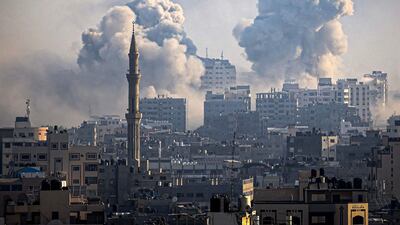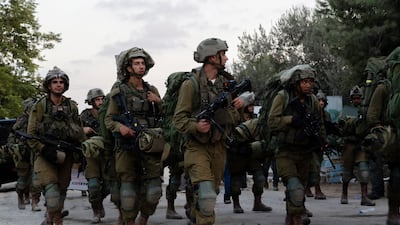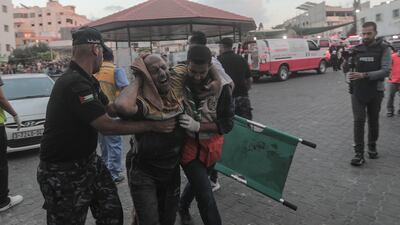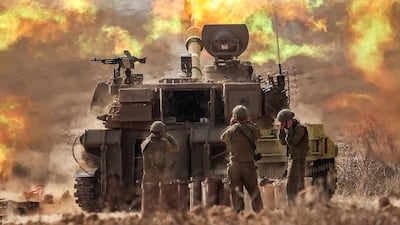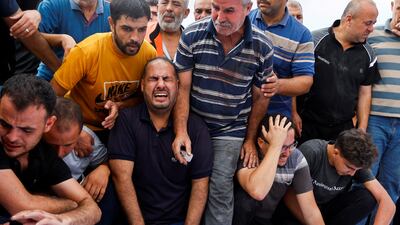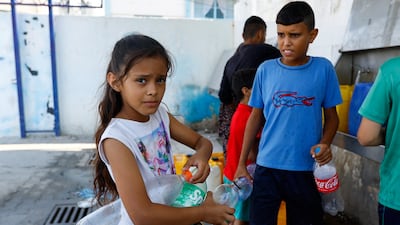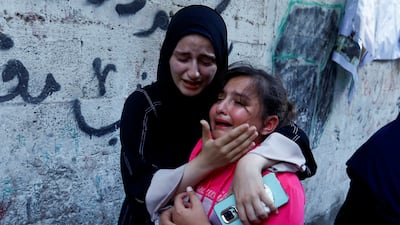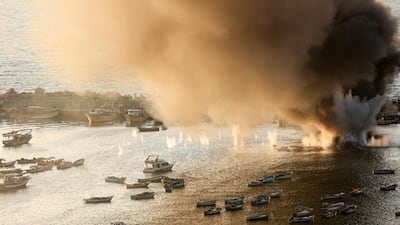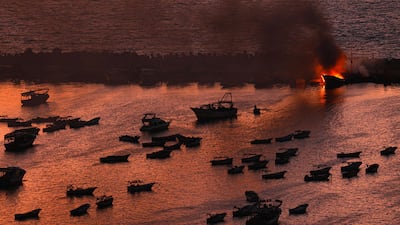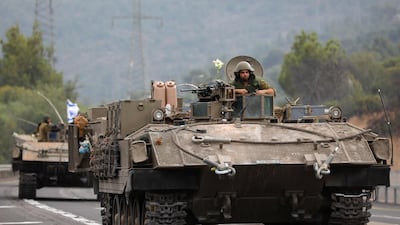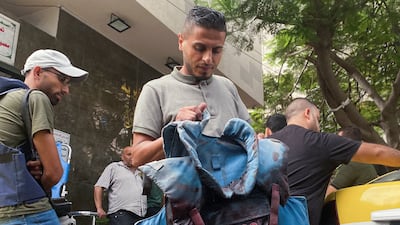Live updates: Follow the latest news on Israel-Palestine
Bombs dropped by Israel lit up the skies over southern Lebanon on Tuesday evening as forces retaliated against Hezbollah targets.
Munitions were dropped on suspected targets in the border region a day after a gun battle between Israel's military and Hezbollah militants.
Hours earlier, the powerful Iran-backed organisation buried three of its members who were killed in an Israeli strike.
The clashes along the Lebanon-Israel border came three days after Hamas, the Palestinian militant group governing Gaza, launched a co-ordinated attack that killed more than 900 Israelis, mostly civilians.
Unifil spokesman
This raises concerns about Lebanon becoming a second front in the war between Israel and Hezbollah-allied Hamas.
“At around 5.30pm, Unifil [UN Interim Force in Lebanon] detected rocket fire from south of Tyre,” Unifil spokesman Andrea Tinetti told The National.
“We continue to be in contact with authorities on both sides of the Blue Line to de-escalate this very dangerous situation. We urge everyone to exercise restraint at this critical time.”
Israel's military said “15 rockets were launched from Lebanese territory” and that “the IDF Aerial Defence Array successfully intercepted four rocket launches” while “10 launches fell in open areas”.
In retaliation, the Israeli military is “currently responding with artillery fire”, it added.
The Lebanese Army said Israel conducted artillery shelling in the regions of Al Qulayla, Al Dhahira and other border areas within the Tyre district.
Hezbollah and Hamas claimed Tuesday's attacks on Israel from Lebanon, Reuters reported.
“The rocket fire from Qlieleh was fire by Palestinian factions, after which [Israel] shelled our observation points in the Shebaa farms area. The resistance responded by destroying an armoured vehicle in the town of Avivim with guided missiles,” a Hezbollah source told The National.
The Israeli army said there was no casualties in the attack carried out by Hezbollah.
Schools and businesses in the area have been shuttered since Monday, when many residents evacuated due to border clashes after Palestinians militants crossed into Lebanon and Israel retaliated, prompting Hezbollah to respond by firing on an Israeli army barracks.
Palestinian Islamic Jihad, which is supporting Hamas in its war against Israel, have claimed responsibility for these infiltrations.
So far as a result of the border clashes, three members of Hezbollah and two members of Islamic Jihad have been killed, according to the two groups. At least one Israeli soldier was also killed in the battle, the Israeli military said.
Border residents tense after blasts
Despite this, many residents have chosen to stay, even as news broke on Tuesday evening that clashes had erupted again.
“My neighbours just left a few minutes ago,” an elderly Rmeish native told The National. “But I’m staying.”
Like many on the southern frontier, she shrugged off concern for her safety.
“We’re used to it. And I don’t really have anywhere else to go.”
As the possibility of war looms, the lives of residents in villages immediately outside of the area where the clashes are taking place have, for the most part, carried on as usual.
In Hanouiye on Tuesday afternoon, the only indication of the previous night’s border clashes was a funeral procession for one of the three Hezbollah fighters killed in the Israeli bombardment on Monday.
Those attending the funeral who were willing to speak to The National all said they were not frightened by the prospect of war.
“But Sayed [Hassan] Nasrallah won’t be dragged into war until he assesses that it’s appropriate,” said one person – who identified herself as a “woman of southern Lebanon” – referring to the leader of Hezbollah.
“And we support whatever decision he makes.”
Lebanon – where Hezbollah wields considerable power – and Israel have technically been in a state of war since the latter’s creation in 1948.
Although tension between the two countries often leads to small-scale conflict, it has only rarely erupted into all-out war.
But with Israel threatening a massive ground invasion of the blockaded Gaza Strip and Hezbollah expressing solidarity with Hamas, residents of southern Lebanon question whether their home might be the next front line.
“We have Iran backing us – just like the United States is protecting Israel,” said the woman attending the funeral. “Israel wants to control us, but they won’t.
“They’ve occupied Palestine for the last 75 years. Now they’re finally starting to feel the same oppression.”

